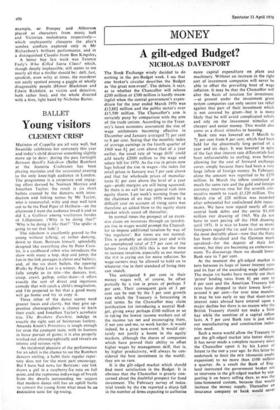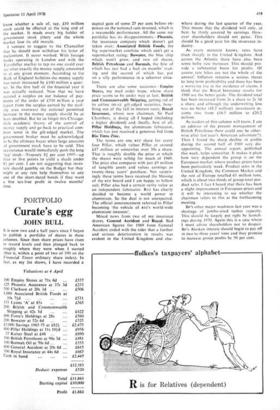MONEY A gilt-edged Budget?
NICHOLAS DAVENPORT
The Stock Exchange wisely decided to do nothing in the pre-Budget week. I see that one broker's circular describes the Budget as 'the great non-event'. The debate, it says, as to whether the Chancellor will release £200 million or £300 million is hardly mean.
ingful when the central government's expen- diture for the year ended March 1970 was 112,882 million and the public sector's over £15,500 million. The Chancellor's arm is certainly puny by comparison with the arm of the trade unions. According to the Treas- ury's latest economic assessment the size of wage settlements becoming effective in December and January averaged 7+ per cent to 8 per cent. Seeing that the monthly index of average earnings in the fourth quarter of 1969 was 81 per cent above that of a year earlier, the usual rate of 'wage drift' could add nearly £2000 million to the wage and
salary bill for 1970. As the rise in prices now lags behind the rise in wages—the index for retail prices in January was 5 per cent above and that for wholesale prices of manufac- tures 4+ per cent above the level of a year ago—profit margins are still being squeezed. So there is no call for any general rush into equity shares. Last week's warning from the the chairman of ict that 1970 would be a difficult year on account of rising costs was therefore an added blow to the equity share market which eased off thereafter.
In normal times the prospect of an exces- sive claim on resources through an inordin- ate rise in wages would prompt the Chancel- lor to impose additional taxation by way of 'the regulator'. But times are not normal. This is probably an election year and with an unemployed total of 2.7 per cent of the labour force (624,383) this is not the time to increase taxation, especially as our master the -rue is crying out for more reflation. So wage-earners may be allowed to hold on to whatever rise in their standard of living they can snatch.
The anticipated 8 per cent in their money wages will, of course, be offset partially by a rise in prices of perhaps 5 per cent. Their consequent gain of 3 per cent can be met by the 3 per cent growth rate which the Treasury is forecasting in real terms. So the Chancellor may claim justification for introducing a neutral Bud- get, giving away perhaps £100 million or so in taking the lowest income workers out of the income tax net and encouraging them, if not you and me, to work harder. It would indeed, be a great non-event. It would cer- tainly not justify a boom in the equity markets, although the shares of companies which have proved their ability to offset higher wages by management skill, that is, by higher productivity, will always be con- sidered the best investment in the world: they are so rare.
It is the gilt-edged market which should find most satisfaction in the Budget. It is obvious that the Chancellor is greatly con- cerned about the doubtful prospect for fixed investment. The February survey of indus- trial trends by the CBI reported a sharp fall in the number of firms expecting to authorise
more capital expenditure on plant and machinery. Without an increase in the right sort of investment companies will never be able to offset the prevailing bout of wage inflation. It may be that the Chancellor will alter the basis of taxation for investment —at present under the investment grant system companies can only secure tax relief against that part of their investment which is not covered by grant—but it is more likely that he will avoid complicated reliefs and rely on the investment stimulus of cheaper and easier money. This would also come as a direct stimulus to housing.
Bank rate was lowered on 5 March to 7+ per cent from 8 per cent, which had been held for the abnormally long period of a year and six days. It was lowered in spite of the fact that interest rate differentials had
been unfavourable to sterling, even before allowing for the cost of forward exchange cover, simply because there had been a very large inflow of foreign money. In February alone the amount was reported to be £250 million. In March the inflow continued at much the same rate and the gold and foreign currency reserves rose for the seventh con- secutive month to reach £1,129 million. The March rise of £28 million was recorded after substantial but undisclosed debt repay- ments. We have now repaid nearly all our central bank debts and the entire $1,400 million IMF drawing of 1965. We do not have to start paying off the 1968 drawing until 1971. It is nice to know that so many foreigners regard the tac and its currency as the most desirable place—now that the franc has been devalued and the German mark upvalued—for the deposit of their hot money. but they are becoming an embarrass- ment. To discourage them we should lower Bank rate to 7 per cent.
At the moment the gilt-edged market is torn between its hope of lower interest rates and its fear of the ascending wage inflation. The major us banks have recently cut their 'prime' lending rates from 84- per cent to 8 per cent and the American Treasury bill rates have dropped to their lowest level— around 6 per cent—for over nine months. It may be too early to say that short-term interest rates abroad have entered upon a major decline but there is no reason why the British Treasury should not make a little hay while the sunshine of a capital inflow lasts. A 7 per cent Bank rate is just what our manufacturing and construction indus- tries need.
Such a move would allow the Treasury to put the gilt-edged market into better shape. It has never made a complete recovery since the Chancellor upset it by his Letter of Intent to the IMP a year ago. In this letter he undertook to limit the DCE (domestic -credit expansion) to no more than VW million a quarter. As a result the Bank of Eng- land instructed the government broker not to intervene in the gilt-edged market by sup- porting it on heavy selling days, as was the time-honoured custom, because that would increase the money supply. Thereafter an insurance company or bank would never know whether a sale of, say, £10 million stock could be effected at the long end of the market. It made every big holder of government stock jittery and the whole market lose its old morale.
I venture to suggest to the Chancellor that he should now withdraw his letter of malcontent. It never worked. With foreign banks operating in London and with the Eurodollar market to tap no one could ever say what exactly the money supply amounted to at any given moment. According to the Bank of England bulletins the money supply was never increased by £100 million a quar- ter. In the first half of the financial year it was actually reduced. Now that we have secured a -surplus on our balance of pay- ments of the order of £500 mllion a year (apart from the surplus earned by the sterl- ing area overseas) the notional permitted increase in the money supply should be at least doubled. But let us forget this Chicago- style academic theory of the control of money supply and go back to practical com- mon sense in the gilt-edged market. The government broker must be acknowledged to be the ultimate buyer when large amounts of government stock have to be sold. This reassurance would immediately push the long 'tap' stock—Treasury 84 per cent 1997—up four or five points to yield a shade under 81 per cent. I am not suggesting that inves- tors should gamble on the Budget but they might at any rate help themselves to any one of the short-dated bonds if they want a fine tax-free profit in twelve months' time.







































 Previous page
Previous page